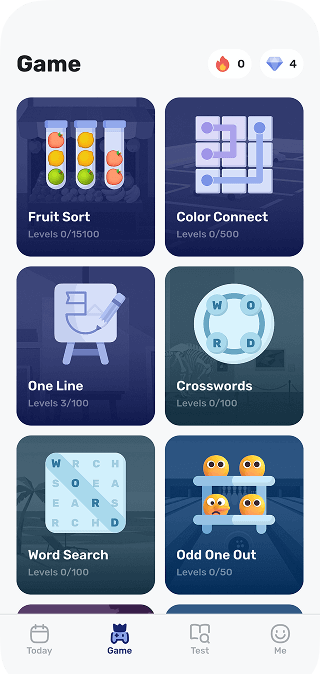Unveiling the Mysteries of Personality: Introverts, Extroverts, and Ambiverts
Jerry Lead Contributor / Nov 3, 2025
In everyday life, everyone has different patterns of behavior in social situations. Some people like to socialize to their heart's content in a crowd, while others prefer to be alone with their thoughts in a quiet environment. Behind this difference lies the secret of personality types.

In this article, we'll take you on an in-depth look at the characteristics of three personality types, the differences, and how to excel according to your personality type.
What is an Introvert?
Introverts are a personality type that tends to get their energy from their inner world and solitude. Introverts usually feel comfortable in quiet environments, and thinking and reflecting alone is how they recharge their batteries. For example, introverts may prefer deep conversations rather than frequent interactions in social situations. According to psychologist Carl Jung, introverts are more inclined to focus on their inner world than their external environment.
Traits of Introverts
Recharging Alone: Introverts are able to rejuvenate when they are alone because they draw energy from their inner world. Being alone is a way for them to relax and recover.
Deep Thinking: They tend to think deeply about problems and like to weigh possibilities carefully before making decisions. This deep-thinking approach makes them more analytical when faced with complex problems.
Cautious: Introverts are usually more cautious in expressing their ideas, preferring to think things through before speaking. This caution helps them to avoid unnecessary misunderstandings in communication.
Preference for Small Groups: In social situations, Introverts prefer small group interactions to large gatherings. The small group setting allows them to communicate more deeply rather than feeling exhausted in a crowd.

What is an Extrovert?
Extroverts are a personality type who get their energy from the outside world and from socializing. Extroverts usually feel excited in crowds and enjoy interacting and communicating with others. Extroverts tend to be more active in social situations, and they are able to derive satisfaction from interacting with others. According to Jung's theory, extroverts are more inclined to focus on the external world rather than their own internal world.
Traits of Extroverts
Socially Active: Extroverts are very active in social situations; they enjoy interacting with people and are able to gain energy from it. Socializing is a great source of energy for them.
Quick to React: They are usually able to react quickly and enjoy exchanging ideas with others in their thought process. This ability to react quickly allows them to excel in teamwork.
Cheerful and Extroverted: Extroverts are outgoing, express their thoughts and emotions, and are able to connect with others easily. This cheerfulness makes it easier for them to gain the attention of others in social situations.
Loves excitement: Extroverts tend to enjoy trying new things and experiences, and they are curious about what's new. This curiosity drives them to keep exploring the unknown.

What is an Ambivert?
Ambiverts are a personality type that falls between introverts and extroverts. They are both introverts and extroverts, and are able to adapt their behavior to different environments and situations. Ambivert personalities can enjoy interaction with others in social situations as well as feel comfortable in solitude. This personality type is better able to adapt to different social situations.
Traits of Ambiverts
Flexibility: Ambiverts are able to adapt their behavior to the situation, both by being outgoing in social situations and by remaining introverted when needed. This flexibility allows them to adapt to a variety of different social scenarios.
Sense of Balance: They are able to balance the needs of the inner world with those of the outer world and do not become overly reliant on one approach for energy.
Adaptable: Ambiverts are able to find their comfort zone in a variety of different social situations, and they are able to adapt to a variety of different social scenarios.
Good listeners: they are able to express themselves as well as listen to others, which makes them behave in a more rounded way in relationships.
How do you know Your Personality Type?
Understanding your personality type can be done in a number of ways, and one effective way is to take a personality test. We have developed a personality test tool that can help you gain insight into your personality traits. Through a series of scientifically designed questions, you can find out what makes you tick in terms of socializing, thinking and emotional expression. This test is based on psychological theories and can help you determine more accurately whether you are an introvert, extrovert or ambivert personality.

The Difference Between Introverts and Extroverts
Introverts and extroverts differ significantly in several ways. Introverts usually get their energy from being alone, preferring to think deeply and express themselves carefully, and preferring to interact in small groups. Extroverts, on the other hand, get their energy from socializing, are responsive and outgoing, and like to try new things. These differences not only affect their social behavior, but also determine how they behave in different situations.
Trait | Introverts | Extroverts |
Energy Source | Recharge through solitude and quiet time | Gain energy from social interactions and external stimuli |
Thinking Style | Deep, reflective, and internal processing | Quick, reactive, and external processing through discussion |
Social Preference | Smaller, intimate settings; one-on-one conversations | Larger, lively gatherings; group interactions |
Communication Style | Reserved, cautious, and more listening-oriented | Outgoing, expressive, and more speaking-oriented |
Practical Advice for Each Personality Type
How Introverts Thrive
Schedule alone time:
Introverts need regularly scheduled alone time to rejuvenate. For example, schedule 30 minutes of reading time each evening or spend an afternoon meditating on the weekend. This kind of alone time can help introverts recover and recharge from daily social activities.
Deep communication:
Introverts prefer deep communication to superficial small talk in social situations. This can be done by having deep conversations with a few close friends to share each other's thoughts and feelings. For example, at parties, choose to have one-on-one conversations with one or two familiar friends rather than forcing inclusion in a large group.
Set social boundaries:
Learn to turn down social invitations that wear you down. For example, if a party is not particularly important, politely decline and prioritize your alone time.
Play to your listening strengths:
Introverts are usually good listeners, which can be a big advantage in socializing. By listening to the thoughts and feelings of others, deeper relationships can be built. For example, when interacting with others, give them more attention instead of rushing to make your point.
Cultivate personal interests:
Introverts usually have a strong interest in particular activities or interests. Alone time can be utilized to learn to paint, write, or take up other personal hobbies. These activities not only bring inner satisfaction, but also help introverts find common ground in socializing.

How Extroverts Thrive
Stay social:
Attend social events regularly, which helps extroverts gain energy. For example, schedule a weekly meeting with friends or join a social club. Not only do social events fulfill extroverts' need to socialize, they also help them make new friends.
Try new things:
constantly trying new experiences can fulfill an extrovert's need for stimulation. For example, try a new sport, volunteer or learn a new skill. Not only are these new experiences refreshing, but they also broaden the extrovert's horizons.
Practice listening:
Although extroverts like to express themselves, it is also important to learn to listen to others. You can practice listening by using the “3:1 rule,” which means that for every three minutes of listening, you should spend one minute expressing yourself.
Manage impulses:
Extroverts are often quick to respond, but they are also prone to impulsivity. Avoid impulsive decision-making by taking a “24-hour cooling-off period” before making a major decision. For example, take time to think about the pros and cons of a new job before deciding whether or not to take it, rather than rushing into a decision.
Stay energized:
Extroverts need to keep their energy levels high by engaging in physical activity, working out, or exercising outdoors.
Utilize Leadership Strengths:
Extroverts typically have strong leadership skills that can be utilized in teamwork. For example, they can take the initiative to take on the role of project leader and lead the team in accomplishing tasks. By utilizing their leadership skills, extroverts can achieve more at work.

Final Thoughts
Whether you are an introvert, extrovert, or ambivert personality, each personality type has its own unique strengths. By getting to know ourselves better, we can better utilize our strengths and find ways to fit in socially and in life.
Disclaimer
Any assessments and their associated content on this website, regardless of date, are not intended to replace direct medical advice from your physician or other professional. If you experience severe or persistent symptoms, please consult a licensed mental health professional or healthcare provider.












